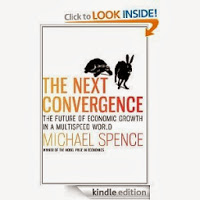Economia
Michael Spence
With the British Industrial Revolution, part of the world’s population started to experience extraordinary economic growth—leading to enormous gaps in wealth and living standards between the industrialized West and the rest of the world. This pattern of divergence reversed after World War II, and now we are midway through a century of high and accelerating growth in the developing world and a new convergence with the advanced countries—a trend that is set to reshape the world.
Michael Spence, winner of the Nobel Prize in Economic Sciences, explains what happened to cause this dramatic shift in the prospects of the five billion people who live in developing countries. The growth rates are extraordinary, and continuing them presents unprecedented challenges in governance, international coordination, and ecological sustainability. The implications for those living in the advanced countries are great but little understood.
Spence clearly and boldly describes what’s at stake for all of us as he looks ahead to how the global economy will develop over the next fifty years. The Next Convergence is certain to spark a heated debate how best to move forward in the post-crisis period and reset the balance between national and international economic interests, and short-term fixes and long-term sustainability.
Mais
- Pobreza E Riqueza Na Perspectiva Histórica
Why Does 1% of History Have 99% of the Wealth? Throughout the history of the world, the average person on earth has been extremely poor: subsisting on the modern equivalent of $3 per day. This was true until 1800, at which point average wages—and...
- O Modelo Sueco
The Swedish model for economic recovery Sweden was the world’s third-richest country in 1968 but became a massive welfare state in the 1970s and 1980s and a prototype for how not to run an economy. It slid to No. 17 in the global income rankings...
- Tempo Perdido
Lost time Apr 17th 2012, 15:09 by The Economist online How many years of economic output has the rich world lost? SINCE the financial crisis struck in 2008, the economic output of most of the rich world has stalled. By the end of the last quarter...
- Desenvolvimento Global
May 17, 2011—By 2025, six major emerging economies—Brazil, China, India, Indonesia, South Korea, and Russia—will account for more than half of all global growth, and the international monetary system will no longer be dominated by a single currency....
-
Hernando de Soto Excelente discurso. Advancing Liberty Trecho: As Professor Friedman said in his remarks, the sorts of solutions that poor countries need are the kinds of things that developed countries did in the 19th Century, not the 21st Century....
Economia
O futuro do crescimento econômico
 The Next Convergence: The Future of Economic Growth in a Multispeed World [Kindle Edition]
The Next Convergence: The Future of Economic Growth in a Multispeed World [Kindle Edition]
Michael SpenceWith the British Industrial Revolution, part of the world’s population started to experience extraordinary economic growth—leading to enormous gaps in wealth and living standards between the industrialized West and the rest of the world. This pattern of divergence reversed after World War II, and now we are midway through a century of high and accelerating growth in the developing world and a new convergence with the advanced countries—a trend that is set to reshape the world.
Michael Spence, winner of the Nobel Prize in Economic Sciences, explains what happened to cause this dramatic shift in the prospects of the five billion people who live in developing countries. The growth rates are extraordinary, and continuing them presents unprecedented challenges in governance, international coordination, and ecological sustainability. The implications for those living in the advanced countries are great but little understood.
Spence clearly and boldly describes what’s at stake for all of us as he looks ahead to how the global economy will develop over the next fifty years. The Next Convergence is certain to spark a heated debate how best to move forward in the post-crisis period and reset the balance between national and international economic interests, and short-term fixes and long-term sustainability.
Mais
loading...
- Pobreza E Riqueza Na Perspectiva Histórica
Why Does 1% of History Have 99% of the Wealth? Throughout the history of the world, the average person on earth has been extremely poor: subsisting on the modern equivalent of $3 per day. This was true until 1800, at which point average wages—and...
- O Modelo Sueco
The Swedish model for economic recovery Sweden was the world’s third-richest country in 1968 but became a massive welfare state in the 1970s and 1980s and a prototype for how not to run an economy. It slid to No. 17 in the global income rankings...
- Tempo Perdido
Lost time Apr 17th 2012, 15:09 by The Economist online How many years of economic output has the rich world lost? SINCE the financial crisis struck in 2008, the economic output of most of the rich world has stalled. By the end of the last quarter...
- Desenvolvimento Global
May 17, 2011—By 2025, six major emerging economies—Brazil, China, India, Indonesia, South Korea, and Russia—will account for more than half of all global growth, and the international monetary system will no longer be dominated by a single currency....
-
Hernando de Soto Excelente discurso. Advancing Liberty Trecho: As Professor Friedman said in his remarks, the sorts of solutions that poor countries need are the kinds of things that developed countries did in the 19th Century, not the 21st Century....
